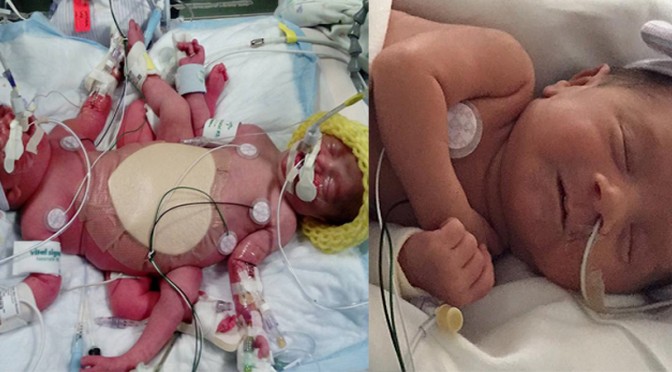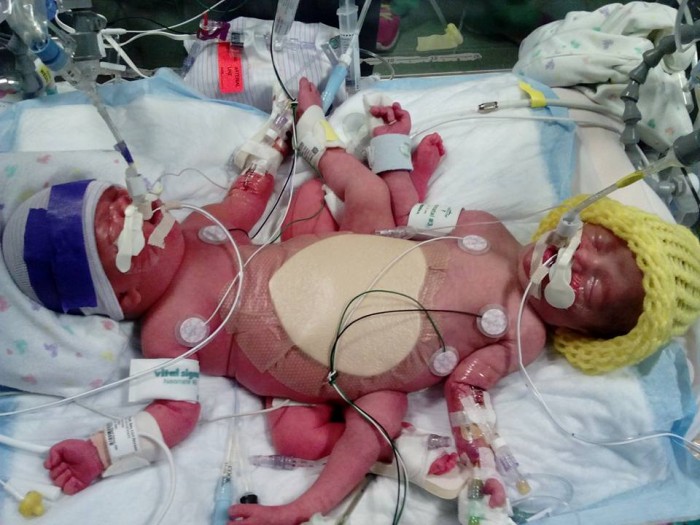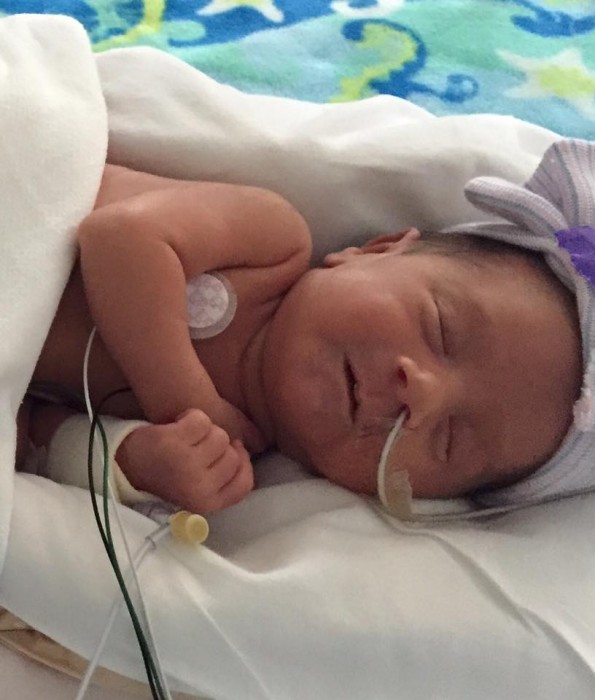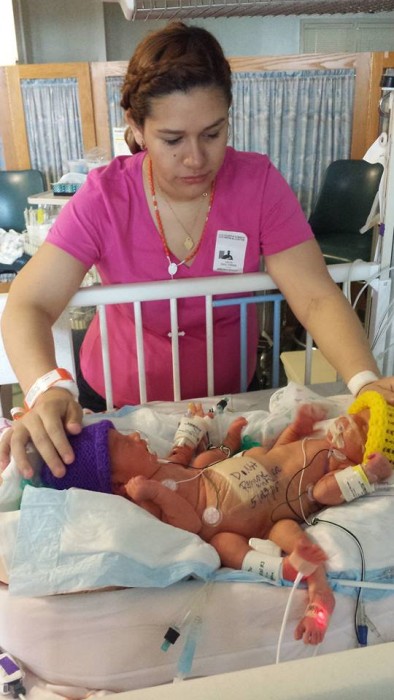Preemie survives and thrives but this only makes her mother more supportive of “later abortions”
By Dave Andrusko

From
the pro-abortion perspective, if there is a foundational principle, it
is that no matter what the outcome, the decision must always rest
exclusively in the hands of the mother. Even when the choice is for life
(ugh), the proper measuring stick is not that the baby is alive but
that the mother alone gave the thumbs up for life or the thumbs down for
death.
She chose one but she could have chosen the other. It is the decision
maker, not the ethical quality of the decision, that counts.
I had meant to write about “
Having a Severely Premature Baby Strengthened My Support for Every Woman’s Right to Choose”
by Dallas Schubert when it first appeared. But the conclusion is so
counter-intuitive that it’s very much worth discussing even a year
later.
Ms. Schubert’s daughter is now a teenager, healthy, happy, and “the
joy of my life.” But 17 years ago, her prospects were grim. Schubert
does a superb job of laying out the highs and lows of a precarious
situation in which she and her husband were given the option of
delivering her very, very premature child and doing nothing, or
delivering her baby girl and doing everything possible.
Schubert writes of her daughter (who was born “at just under 24 weeks, weighing 590 grams and measuring just 12 inches”)
I couldn’t let her go. Lying
there pumped full of magnesium, scared and tired, I couldn’t let go of
the idea of that child I had become attached to over those almost six
months. I couldn’t let go of my expectations of parenthood. I couldn’t
accept the inevitability of grief. And so I said, “Do everything you
can.” The NICU team was called, I was whisked to surgery, and we began
the next stage of our journey.
It was touch and go, with the odds very much against her baby. But
she survived and after 100 days in the hospital, came home. Schubert
writes, “We were lucky. We were amazingly, extraordinarily lucky.”
You might ask yourself, how does this beautiful story of courage and
commitment and good fortune get transmogrified into even greater support
and empathy “for women’s access to later abortions”?
For starters, the intoxicating exercise of power. Her husband, who
makes an appearance in the beginning of her account, is (of course)
excluded when it’s crunch time.
“The choice regarding my daughter’s care was mine, as it should have
been,” Schubert wrote. “It was both my moral right and my
responsibility. I was her mother. She was growing in me. The complex
decisions about her life were mine to make, and I made them as best I
could.”
Of course, once her daughter was delivered, she would no longer “be
growing in me.” What would ensue–and her daughter could have faced
significant challenges as she grew, a major component of Schubert’s
retrospective moral calculus–would happen both to Schubert
and her husband.
Apparently it never crossed Schubert’s mind that her husband could just as well have said, “But I was her father.”
She goes on
I made a choice that was born of
my hopes, my dreams, the degree of attachment I had to that pregnancy,
and my expectations about motherhood. I made a choice to avoid immediate
grief and pain. That choice could have condemned her to a more painful
death, or a painful life. The consequences of that decision were not
just mine to live with; they were hers as well. I believe it is from
that very same place that most women make the decision to have an
abortion, or any other number of decisions regarding pregnancy and
parenting. With the ability to bear children comes the awesome and often
difficult power to make decisions about that life.
But she was not carrying a “pregnancy,” Schubert was carrying
their–not her–daughter! To justify blanket support for “later
abortions,” Schubert draws a parallel between her right not to have
actively treated their daughter at birth with the decision to abort a
child, presumably facing the possibility of major medical difficulties.
However most babies are aborted late/later in pregnancy not because
of “fetal anomalies,” but because their mothers often refuse to
acknowledge they are pregnant
and/or because they are
ambivalent. The assistant to the late abortionist George Tiller said so
in an interview just this past weekend, as we reported on yesterday.
“With the ability to bear children,” Schubert writes with
pseudo-solemnity, “comes the awesome and often difficult power to make
decisions about that life.”
But how about the awesome and difficult responsibility to care for the child–before and after birth?
Schubert ends by contemplating the likelihood that if she had chosen
otherwise, she would not have received the many compliments she did:
“society” would “not have supported and embraced me.”
This leads to an angry “how dare you?” conclusion: “I can’t imagine
what it would have been like to have my choice taken from me, or to have
endured shame and stigma from society for it.”
At the risk of stating the obvious, Schubert had already taken the
choice to have a role in what happened to their daughter away from her
husband.
And to make an equally obvious point, the dire predictions the
doctors gave her 17 years ago– that there was “a 25 percent chance of
survival if we resuscitated, and that if she survived she had an over 75
percent chance of significant disability and chronic medical
need”–provided to be 100% wrong.
Talk about learning all the wrong lessons.
Source: NRLC News











 In
the pharmaceutical industry, as soon as someone makes a widely selling
drug, it usually isn’t long before there are lots of companies trying to
figure out the formula and sell knockoff generics.
In
the pharmaceutical industry, as soon as someone makes a widely selling
drug, it usually isn’t long before there are lots of companies trying to
figure out the formula and sell knockoff generics. The little backward arrow icon on my emails has become one of my best friends.
The little backward arrow icon on my emails has become one of my best friends. A
bill that violates the free speech rights of privately-funded pro-life
pregnancy centers in the state of California by forcing them to
advertise and promote abortion has now passed the state Assembly and
advances to the Senate.
A
bill that violates the free speech rights of privately-funded pro-life
pregnancy centers in the state of California by forcing them to
advertise and promote abortion has now passed the state Assembly and
advances to the Senate.


 “Since You Asked,” I gather, is a kind of advice column found
“Since You Asked,” I gather, is a kind of advice column found  It
used to be that families and mental health professionals were the last
bastions helping despairing people (for whatever reasons) stay in life.
These days, even that bastion is crumbling.
It
used to be that families and mental health professionals were the last
bastions helping despairing people (for whatever reasons) stay in life.
These days, even that bastion is crumbling. From
the pro-abortion perspective, if there is a foundational principle, it
is that no matter what the outcome, the decision must always rest
exclusively in the hands of the mother. Even when the choice is for life
(ugh), the proper measuring stick is not that the baby is alive but
that the mother alone gave the thumbs up for life or the thumbs down for
death.
From
the pro-abortion perspective, if there is a foundational principle, it
is that no matter what the outcome, the decision must always rest
exclusively in the hands of the mother. Even when the choice is for life
(ugh), the proper measuring stick is not that the baby is alive but
that the mother alone gave the thumbs up for life or the thumbs down for
death.
 Over
the months, I’d read about “The Farewell Party,” which opened this
week. The movie is set in a “Jerusalem retirement home in which one
resident, an amateur inventor, devises a ‘mercy-killing machine,’”
according to the New York Times’ Stephen Holden.
Over
the months, I’d read about “The Farewell Party,” which opened this
week. The movie is set in a “Jerusalem retirement home in which one
resident, an amateur inventor, devises a ‘mercy-killing machine,’”
according to the New York Times’ Stephen Holden. Among
pro-lifers, it is well-known that many women suffer emotionally after
their abortions. A previous Live Action article about post-abortion
women and suicide mentioned two studies that found that women who
aborted had a six to seven times higher suicide rate than women who did
not.
Among
pro-lifers, it is well-known that many women suffer emotionally after
their abortions. A previous Live Action article about post-abortion
women and suicide mentioned two studies that found that women who
aborted had a six to seven times higher suicide rate than women who did
not.
 Four
officials from different villages in Lanling county in
Shandong Province told Chinese media that they were under an “abortion
quota” and resorted to buying the records of women who had already
aborted to meet the requirements.
Four
officials from different villages in Lanling county in
Shandong Province told Chinese media that they were under an “abortion
quota” and resorted to buying the records of women who had already
aborted to meet the requirements.
 We
already knew that children with Down syndrome are spectacular. But one
Utah dad is using his photography skills to drive home the message that
there is no limit to what people with Down syndrome can accomplish. Alan
Lawrence’s photo series features his 18-month old son Wil in a variety
of settings flying through the air like a superhero.
We
already knew that children with Down syndrome are spectacular. But one
Utah dad is using his photography skills to drive home the message that
there is no limit to what people with Down syndrome can accomplish. Alan
Lawrence’s photo series features his 18-month old son Wil in a variety
of settings flying through the air like a superhero. Lawrence
says the idea came from Wil’s unique crawl that made him look like he
was about to take off in flight. It grew from there once Lawrence
realized the broader impact the photos could have.
Lawrence
says the idea came from Wil’s unique crawl that made him look like he
was about to take off in flight. It grew from there once Lawrence
realized the broader impact the photos could have. Leticia
Velazquez, co-founder of KIDS (Keep Infants with Down Syndrome), writes
this about raising a daughter with Down syndrome, “This is a priceless
gift. Each one of us is grateful that living with Christina has made us
more tolerant of diversity in others, more patient with their weakness,
and more able to give of ourselves in response. Christina has increased
our compassion and our joy.”
Leticia
Velazquez, co-founder of KIDS (Keep Infants with Down Syndrome), writes
this about raising a daughter with Down syndrome, “This is a priceless
gift. Each one of us is grateful that living with Christina has made us
more tolerant of diversity in others, more patient with their weakness,
and more able to give of ourselves in response. Christina has increased
our compassion and our joy.”

 Why
could/would/should it surprise you that Planned Parenthood, which
corrupts everything it touches, also leads the galaxy in hypocrisy?
Why
could/would/should it surprise you that Planned Parenthood, which
corrupts everything it touches, also leads the galaxy in hypocrisy? Bristol,
TN—The American Academy of Medical Ethics denounces the California
Medical Association’s decision to take a “neutral stand” on the
legalization of physician-assisted suicide in their state.
Bristol,
TN—The American Academy of Medical Ethics denounces the California
Medical Association’s decision to take a “neutral stand” on the
legalization of physician-assisted suicide in their state.






